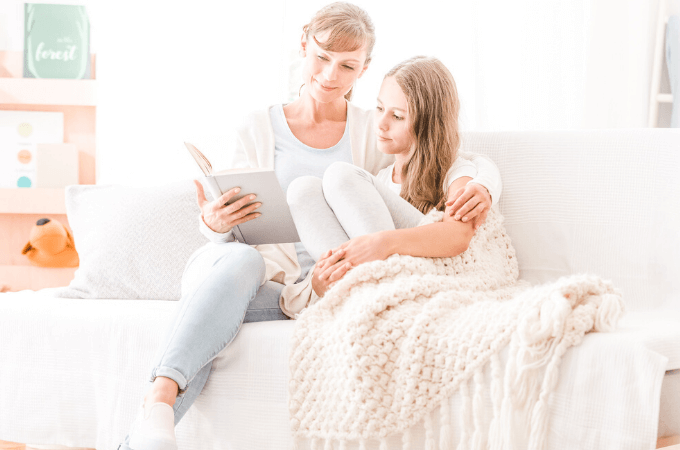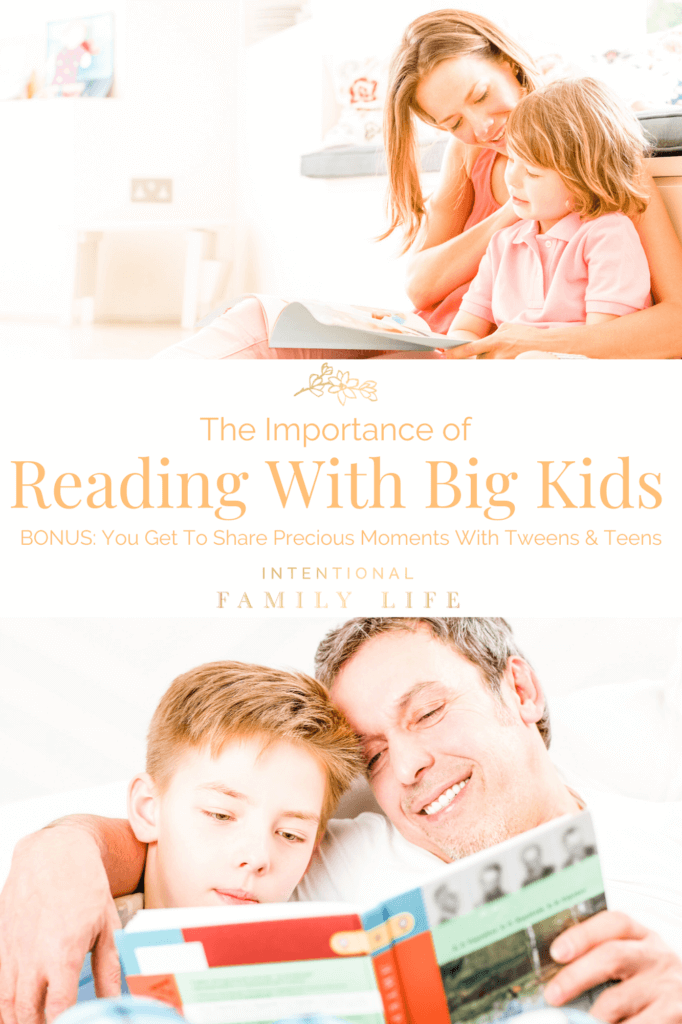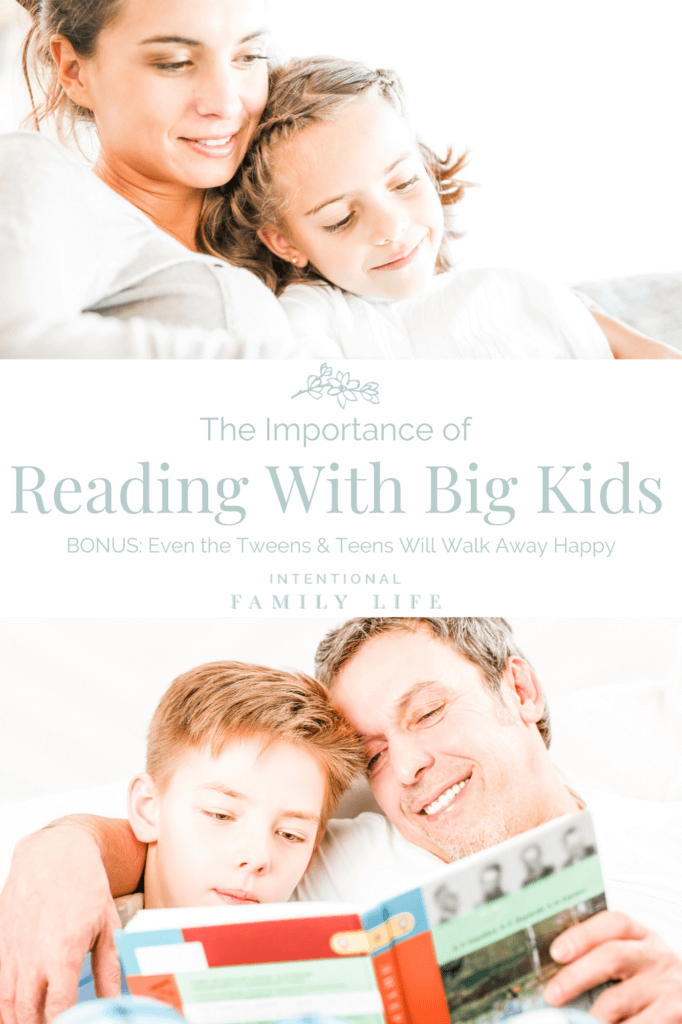Even if your toddler isn’t crawling onto your lap for stories anymore, you can still have an amazing bonding and educational experience reading aloud with your big kids. The importance of reading books to your big kids and helping them continue to develop good reading habits is huge. In fact, you may not be aware of the importance of reading books aloud to big kids, so I wanted to share.
Related Post You May Also Like: Why Bedtime Stories Are More Important Than You Think
One of the best benefits of reading a good book to an older child, for me, is that we bond more tightly as a family at the very time they are starting to become more and more independent. Stories are shared experiences that will be forever etched in our hearts.
“Experts” would tell you that the importance of reading books to big kids includes expanding their vocabulary, increasing brain function, writing skills, language skills, focus and concentration, empathy, and other assorted literacy skills. Of course, they are right.
So whatever your reasons, continue to read a good book with your child long after he has learned to read independently.
Once Children Read Independently, Why Continue to Read Aloud?
When it comes to reading, experts say that you should start reading to your child as early as possible. And I couldn’t agree more. But, reading aloud after children can read independently is also a big deal!
I was quickly convinced to continue reading books aloud to my ten year old son after listening to Andrew Pudewa on Sarah McKenzie’s Read Aloud Revival podcast. According to Pudewa:
One of the biggest mistakes we make as parents and teachers is to stop reading out loud to our children when they reach the age of reading faster independently. In doing so, not only do we deprive them of the opportunity to hear these all-important reliably correct and sophisticated language patterns, we lose the chance to read to them above their level, stretching and expanding their vocabulary, interests and understanding.
We begin to lose the chance to discuss words and their nuance, idioms, cultural expressions, and historical connotations. And they lose something far more valuable than even the linguistic enrichment that oral reading provides: they lose the opportunity to develop attentiveness, the chance to experience the dramatic feeling that a good reader can inject, and even the habit of asking questions about what they’ve heard.
Tragically, because of our hectic, entertainment-saturated, individualistic, test-obsessed and overscheduled lives, few of us take sufficient time to read out loud to our students, even into their early teens—a sensitive period when understanding of language and understanding of life are woven together and sealed into the intellect. (Andrew Pudewa, Institute for Excellence in Writing)
So once your child is reading independently, it is definitely not the time to stop reading books aloud to these older kiddos!
Related Post You May Also Like: Summer 2019 Read Aloud List
The Importance of Reading Books Together: Creating Connection
There are many things that pull families apart these days. One of the biggest in our home is the on-going battle over video games. So I fiercely defend our planned family time together .
Having your big kid sit next to you, as you read to them, is priceless. As much as they won’t admit to it, they’re also enjoying it!
Learning how and why your kids think about different issues or topics in the stories you read is priceless. And I love sharing the ways that we each think of things, because it helps open our minds to new perspectives.
They say with tweens and teens, the best conversations are held in the car when you aren’t making eye contact. And I do think there’s some truth in that. But I also think that reading books with older kids gives you a beautiful opportunity and a safe place for all those conversations you want to share.
Reading books to older kids is ONE thing that we can do today that we did 100 years ago. Reading books aloud can also connect people from different generations, enriching the story and the conversation, unlike any other activity.
Related Post You May Also Like: How To Cultivate A Fantastic Family Reading Habit
The Importance of Reading Books to Build Empathy
How will a child learn empathy for others? Reading fiction is the perfect opportunity for kids to start understanding the experiences of others.
We all know that the rich and deep understanding we have of someone’s circumstances is more easily absorbed through story-telling than through a news broadcast or sound bite.
Children don’t need to go through it themselves to start gaining empathy. Reading builds empathy in your child because it exposes them to situations they would not otherwise see.
One easy way to do this is to select stories about children from different cultures.
Related Post You May Also Enjoy: Interesting Stories To Teach Kids About World Religions
Related Post You May Also Enjoy: Books That Introduce Mexican Culture & Traditions
Related Post You May Also Enjoy: Cinco de Mayo: Discover Mexico’s Magical Culture
Exposes Kids to New Authors, Texts, and Genres
Reading aloud can get kids hooked on a new author or series of books. Once a child falls in love with the story or author, it’s hard to hold them back from reading it on their own.
Plus, reading aloud gives kids a chance to explore genres and texts they wouldn’t normally select for themselves. (The Importance of Reading Aloud to Big Kids).
As homeschoolers, we always have a family read aloud book going. But I started reading a book that was special to just my oldest son and me. So now, we always have one read aloud together.
Before we started our own read aloud time, my son was trapped in a loop of Diary of a Wimpy Kid and Minecraft character studies. Occasionally, he’d toss a fantasy novel into the mix. And I certainly don’t mind that he’s reading these for pleasure. Don’t we all read somewhat below our actual reading level when reading for pleasure?
Now that we are reading books aloud, his world is being opened to so many different styles and genres of writing. He will be able to enjoy, understand, and appreciate a much broader buffet of literature as he grows up.
Reading to Kids Helps Kids Use Their Imagination
How many times have you read the book before seeing the movie adaptation? And how many times were the characters different than you had envisioned and heard them in your mind’s eye?
Every single time, right?
And how many times were they less satisfying than those conjured by your own imagination as you read?
Almost every single time.
We don’t realize as we’re reading all the things that our imagination is doing to take in the story. We create pictures of the characters and scenes. We create voices to go with our characters – maybe a British or Southern accent here and there.
We exercise our “imagination muscles” every time we read aloud. And it’s truly enjoyable to discuss what each one who’s listening thinks the characters look or sound like.
It’s hard to see what electronics have done to everyone, even kids. It’s safe to say that reading helps kids use their imagination. Even big kids have an imagination and reading helps them continue to learn how to use it.
Reading to Kids of All Ages Fuels A Love of Reading
My father began a habit of reading to my mother after dinner each evening early in their marriage. It was a pleasant experience that they shared together. And guess what? The importance of reading, for my mother, transcended her fifteen years with Alzheimer’s disease.
Until her final days, my father read aloud to her. And while she may no longer have been able to hold on to a story line or plot, she was soothed by the sound of his voice and the reading.
No matter her lack of understanding – a love of reading that she found early in life continued to bring her joy.
The Importance Reading to Older Children Includes Vocabulary
A lot of us learn new words through reading. When you read to your older child, you continuously expose them to new literature and vocabulary.
This is different than when they read independently. And this is true especially if they are “good” readers. Good readers tend to read quickly. They rush through passages and skip over words all the time. They will most likely skip over vocabulary words with which they aren’t familiar.
The goal here is to read books to them that are slightly above their own reading level. That way they are exposed to extended vocabulary, syntax, and content.
And while you might think that conversation will expose your kids to a rich vocabulary – it’s not always the case. “…[T]he reality is that we tend to be lazy speakers. We don’t usually use a wide variety of words (especially when talking to/with children because we think they won’t understand) and we aren’t always grammatically correct. When we talk, we generally aren’t taking the time to form well-thought-out sentences.” (Reading Out Loud To Your Kids)
So grad a read aloud and build that vocabulary!
Reading Books Aloud Builds Reading Fluency
The importance of reading aloud to older children includes modeling reading fluency. Reading involves several different aspects, even though most children read in a monotone voice. This is because fluency is something that they learn about as they go.
- Stopping for periods and commas
- Getting excited and using inflection in the voice
- Using different voices for different characters
- Continuously reading
Reading fluency is when a person can read accurately and with expression. Hopefully, kids also get comprehension out of the book they’re reading as well, thanks to fluent reading.
So, no matter what your child’s age, the importance of reading books to older children cannot be overstated. And, as you can see, there are many benefits.
And if you keep reading – you never know. You may get lucky. They may try to crawl right back into your lap! *sigh*
Don’t Forget to Pin This For Later!





